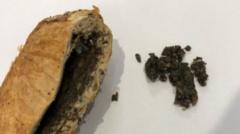Images depicting the infamous Beef Wellington and toxic mushrooms central to Australian woman Erin Patterson’s murder trial have been disclosed following her guilty conviction. Patterson, 50, was found guilty by a jury of murdering three familial guests during a fateful meal in Morwell, Victoria, on July 29, 2023. She was also convicted of attempted murder of a fourth guest who survived the deadly meal.
The trial, which captivated audiences nationally and globally, revealed that Patterson allegedly foraged death cap mushrooms from neighboring areas. Disturbingly, she attempted to hide her actions by disposing of evidence and misinforming law enforcement. Tragically, three people succumbed to mushroom poisoning days post-meal: Patterson's ex-in-laws, Don and Gail Patterson, both aged 70, and Gail's sister, Heather Wilkinson, aged 66. Meanwhile, Heather's spouse, Ian Wilkinson, managed to recover after an extensive hospital stay.
Upon the guilty ruling, the Supreme Court of Victoria released around 100 images presented in court as evidence during the trial. The photos released include remains of the Beef Wellington collected from Patterson’s residence, sealed in specimen bags for contamination prevention before forensic examination for death cap mushroom traces.
Death cap mushrooms rank among the deadliest fungi globally, responsible for the majority of fatal mushroom poisonings. Their caps, ranging in color from greenish-yellow to brown or tan, can significantly endanger human health. Patterson claimed to have purchased dried mushrooms from an Asian grocery but could not recall details, despite police identifying sightings of death cap mushrooms in local vicinity prior to the meal.
Evidence indicates that Patterson had researched death cap mushroom sightings on iNaturalist and that her mobile data tracked her trips to foraging locations. Forensics recovered images of what resembled death cap mushrooms on her phone as well. Even minuscule amounts of these mushrooms can prove fatal, as their deadly toxins remain potent regardless of cooking methods.
Moreover, traces of the poisonous mushrooms were discovered in a food dehydrator Patterson disposed of a day after the incident. Despite claiming she had never owned such an appliance, forensic evidence and previous social media posts contradicted her statements. Even CCTV footage surfaced showing Patterson discarding the dehydrator at a local waste facility, shortly before she visited the hospital with symptoms.
Patterson had sought medical aid two days following the meal but resisted hospital admission for herself and her children, who she insisted had consumed the leftovers. Notably, medical tests revealed no signs of mushroom poisoning in her children. The anguish from the courtroom and the connection to the gruesome events continues to reverberate within the community and beyond.


















